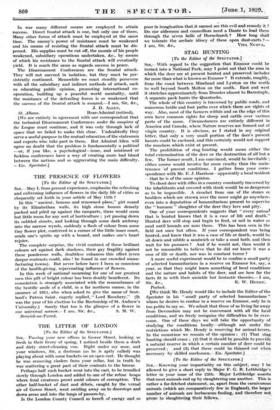STAG HUNTING [To the Editor of the SPECTATOR.] SIR,—With regard
to the suggestion that Exmoor could be turned into a National Park, may I point out that the area in which the deer are at present hunted and preserved includes far more than what is known as Exmoor ? It extends, roughly, from the coast between Minehead and Lynton on the north to well beyond South Molton on the south. East and west it stretches approximately from Dunster almost to Barnstaple. A separate pack hunts the Quantocks.
The whole of this country is traversed by public roads, and numerous bridle and foot 'paths over which there are rights of way. Also, most of the farmers within and on the edge of this area have common rights for sheep and cattle over various parts of the moor. Circumstances are entirely different in America and Canada, where Nature reserves are formed out of virgin country. It is obvious, as I stated in my original letter, that only a very small portion of the deer's present haunts could be enclosed, and this certainly would not support the numbers which exist at present.
The prohibition of stag hunting would mean either the total extermination of the deer or the destruction of all but a few. The former result, I am convinced, would be inevitable ; either course would involve far more cruelty than the main- tenance 'of present conditions. I gather from your corre- spondence with Mr. E. J. Harrison—apparently a local resident —that he is of the same opinion.
• To shoot deer with rifles in a country constantly traversed by the inhabitants and covered with stock would be so dangerous as to be impossible. A ricochet from one of the stones or boulders which are strewn over the moor might go anywhere, even into a deputation of humanitarians present to supervise the" humane" slaughter of the deer they love and pity. One of your correspondents suggests that "every animal that is hunted knows that it is a ease of life and death." Hunted deer will stop and begin to feed, or soil in water or mud until hounds are near them. This has been seen in the field not once but often. If your correspondent was being hunted, and knew that it was a case of life or death, would he, sit down and nibble a sandwich or take a mud bath, and then wait for his pursuers ? And if he would not, then would it not be reasonable to believe that he did not know it was a case of life or death, nor was in constant terror ?
A more useful experiment would be to confine a small party of selected humanitarians in a reserve on Exmoor for, say, a year, so that they might learn something of local conditions and the nature and habits of the deer, and see how far the facts fit in with their amiable but fantastic theories.—I am, • Sir, &c., Porlock. E; W. Itssinv.
(We think Mr. Hendy Would like to include the Editor of the Spectator in his "small party of selected humanitarians" whom he desires to confine in a reserve on Exmoor, only he is too polite to say so. We admit that those of us living far away from Devonshire may not be conversant with all the local conditions, and we freely recognize the difficulties to be over come. One of these' day's we will take the opportunity of studying the conditions locally—although not under the restrictions which Mr. Heady is reserving for animal-lovers. In the meantime we remain of the opinion : (1) That stag hunting should cease ; (2) that it should be possible to provide a natural reserve in which a certain number of deer could be preserved ; and (3) that these could be thinned out 'When necessary by skilled marksmen.—En. Spectator.]










































 Previous page
Previous page